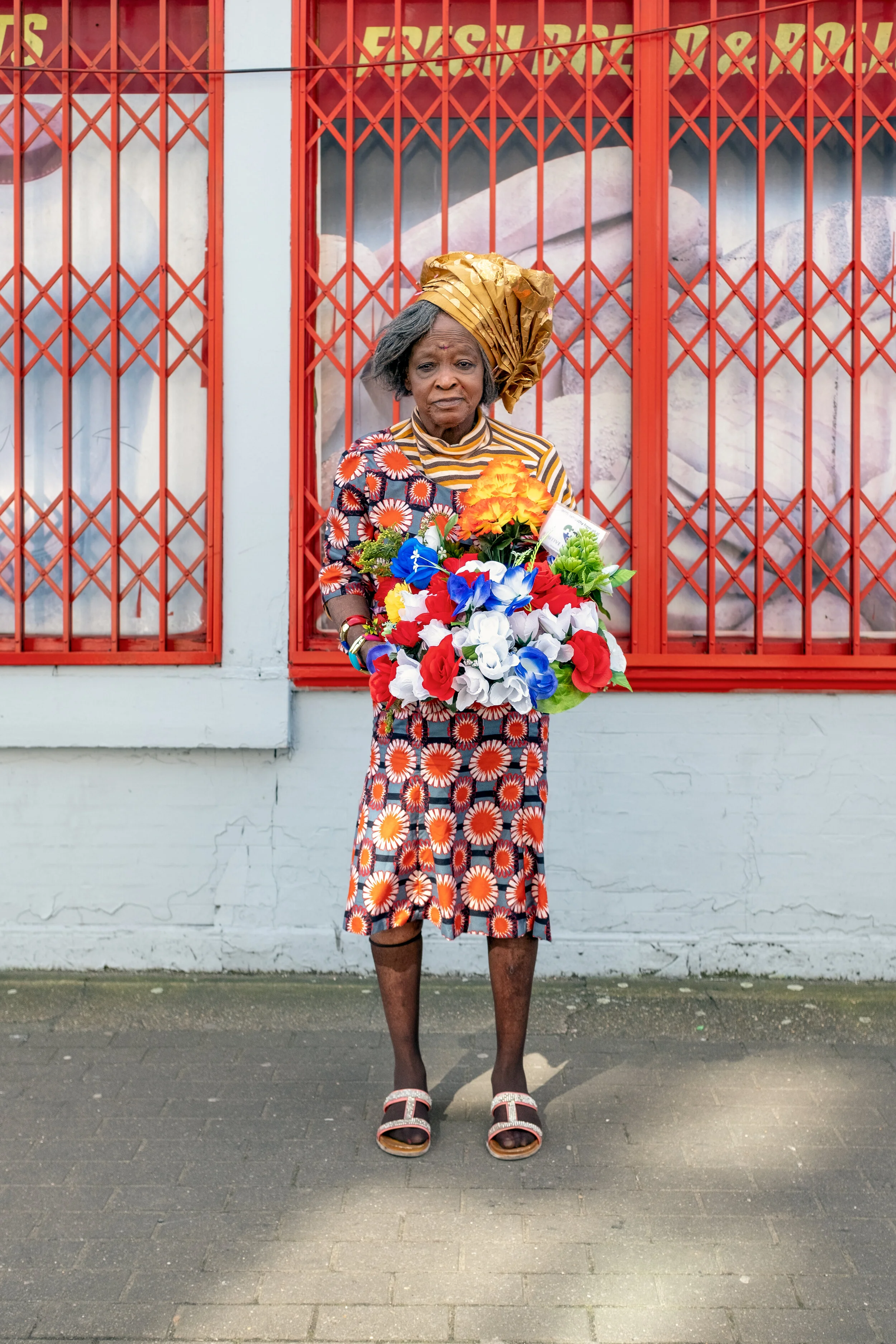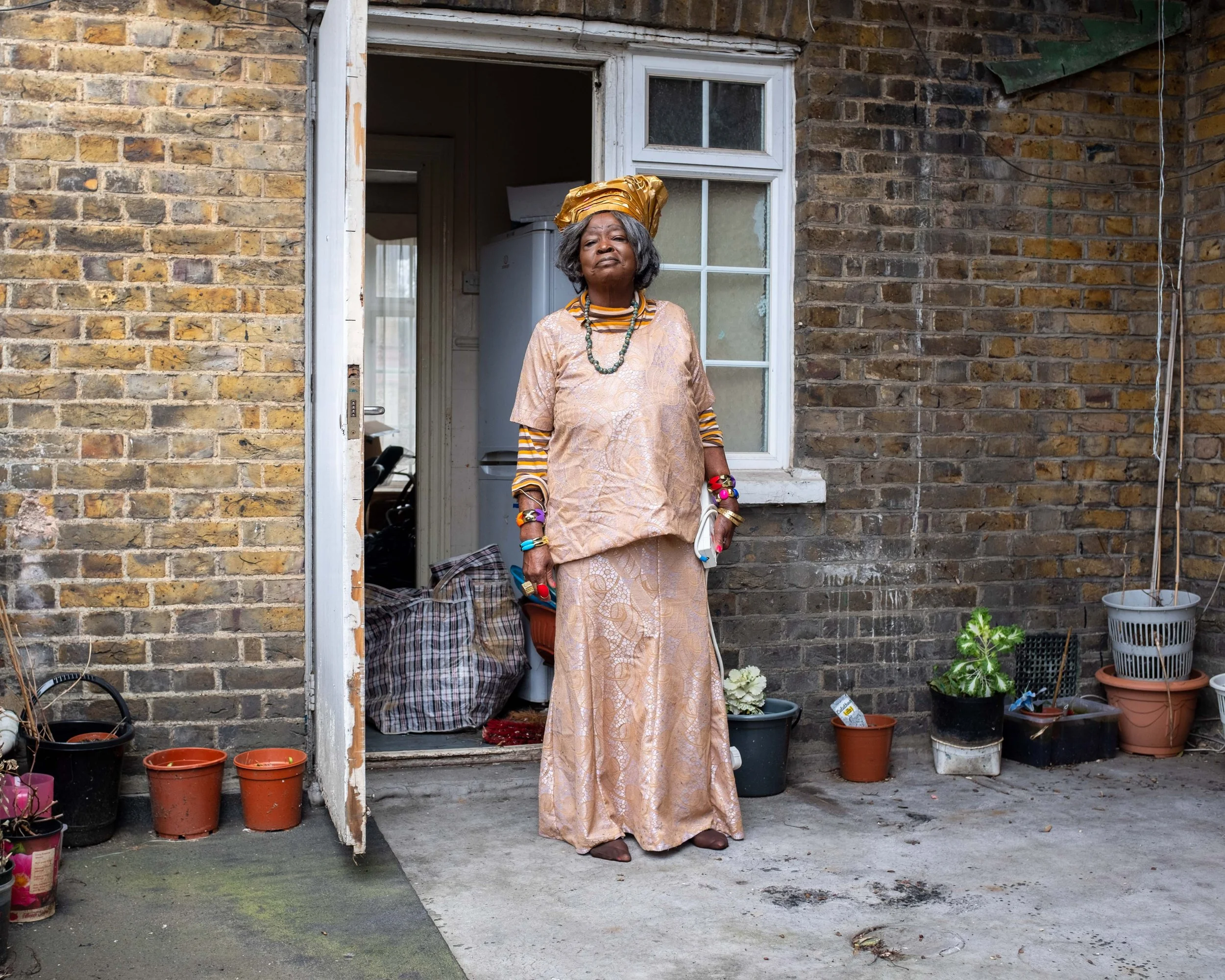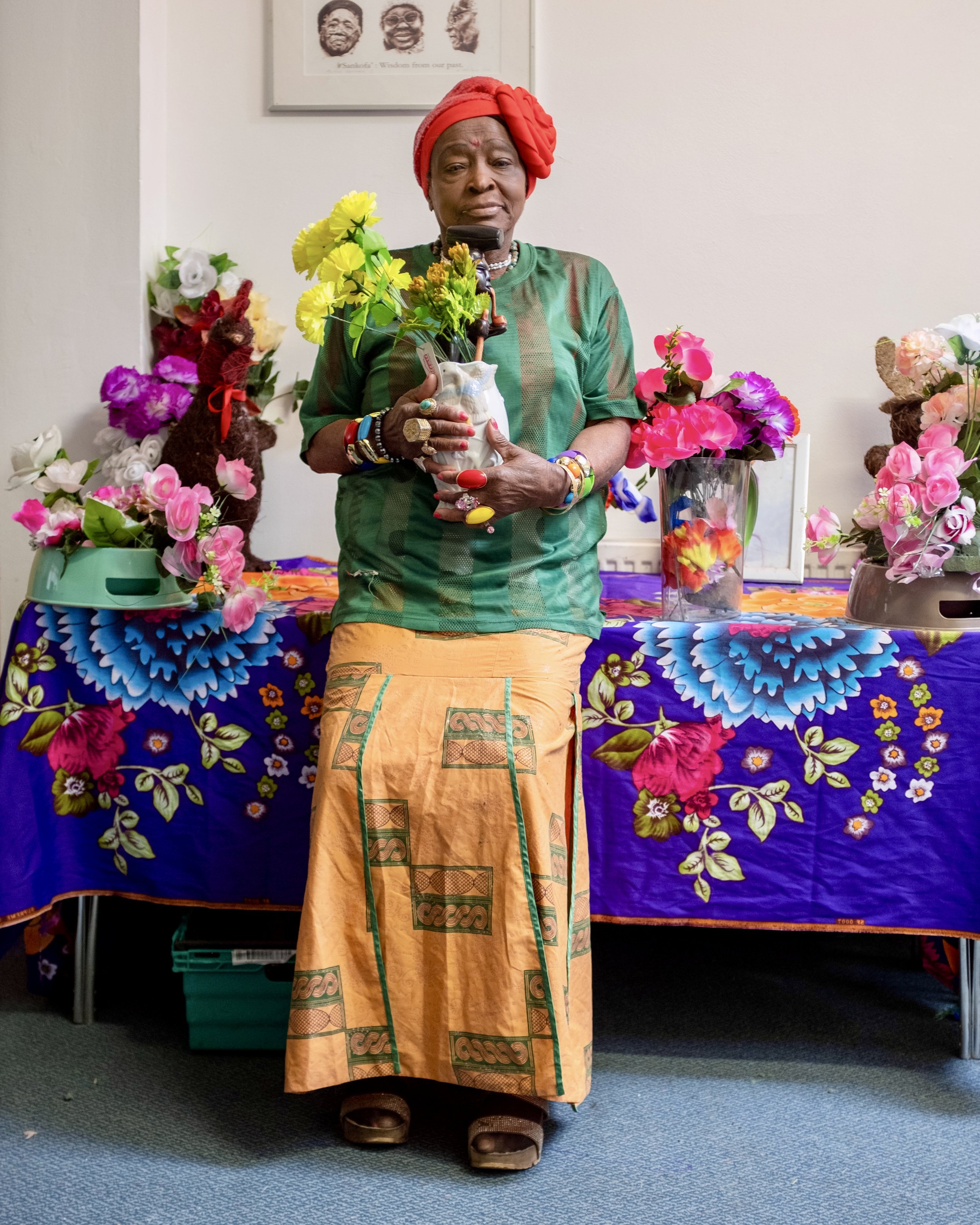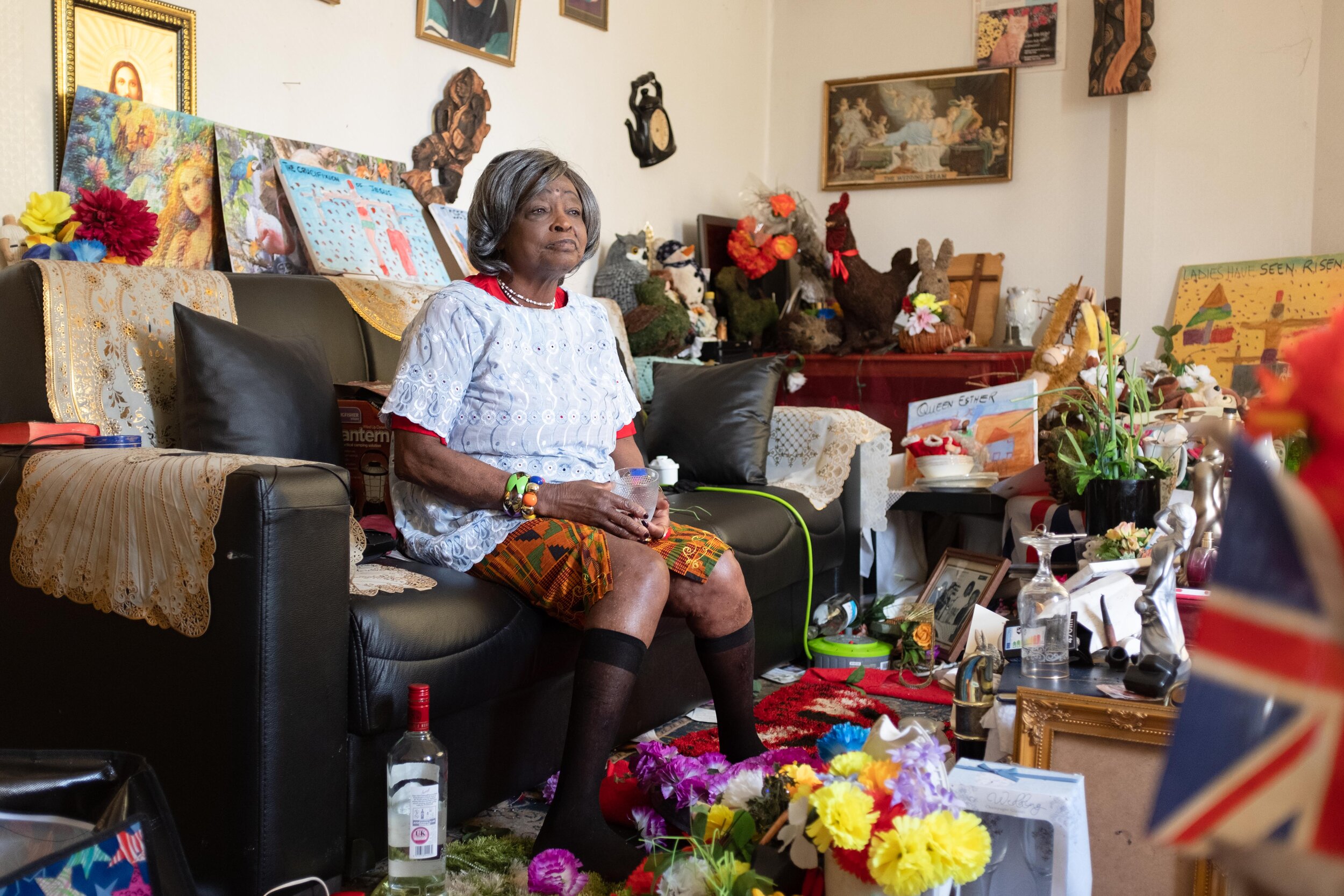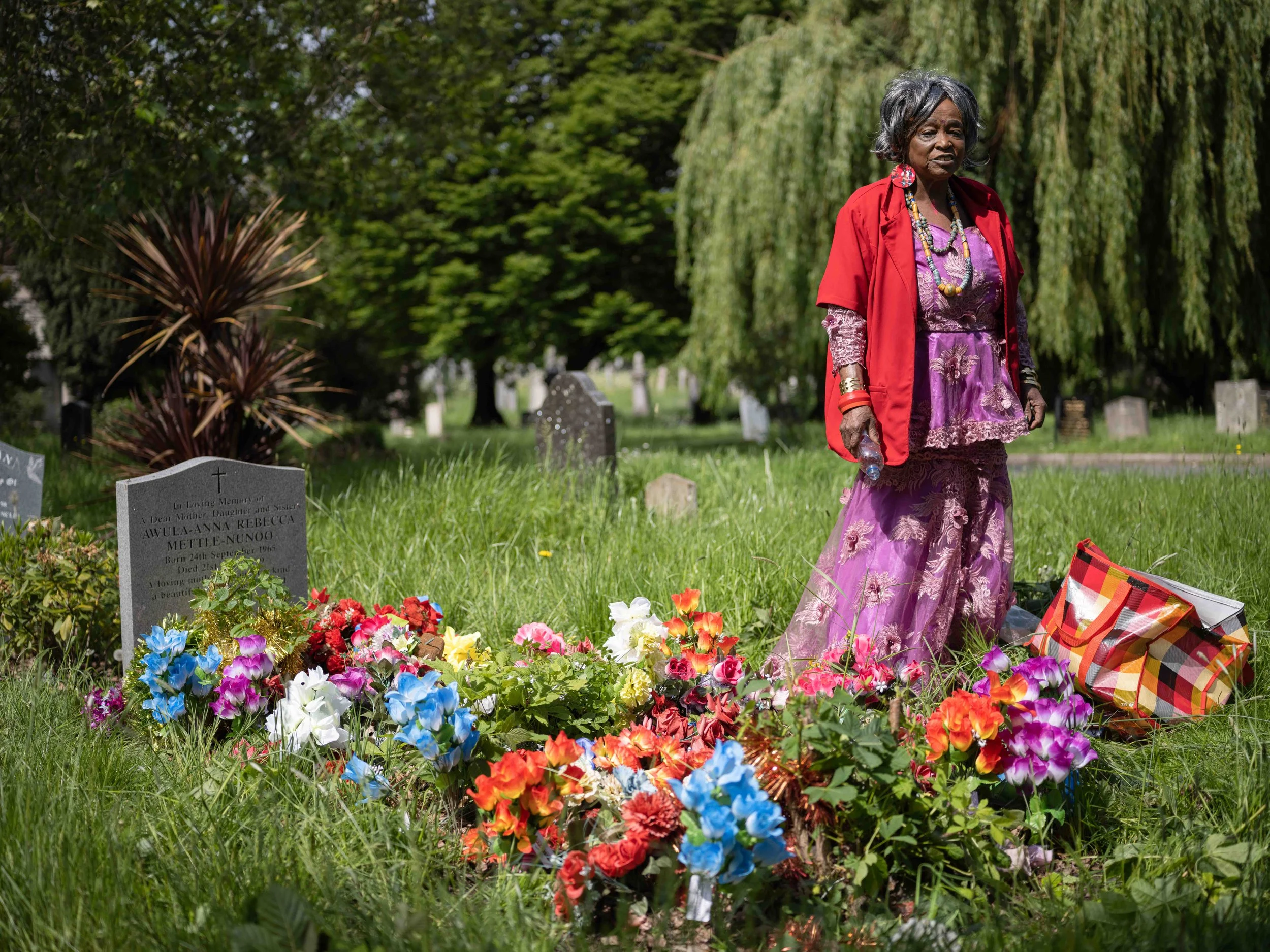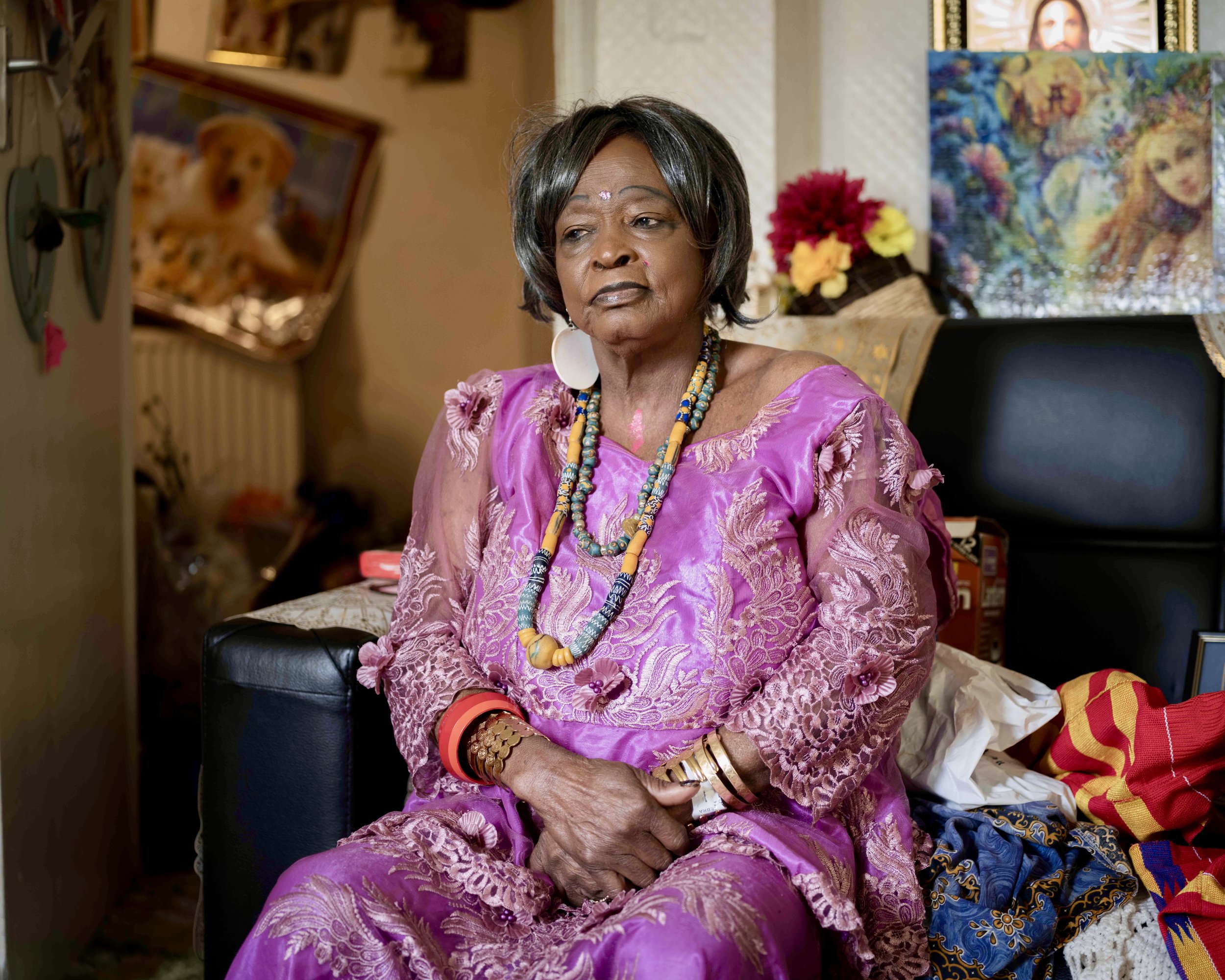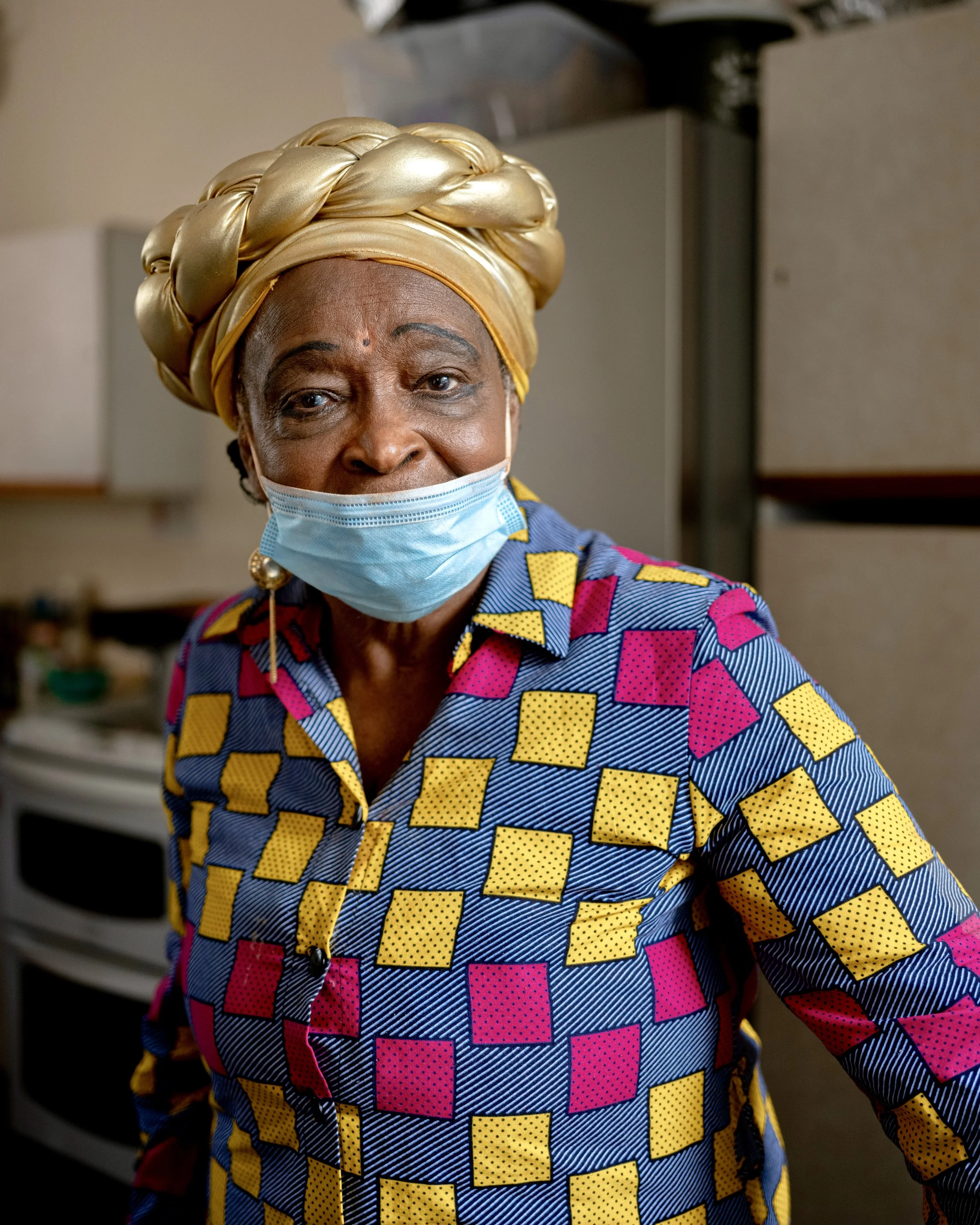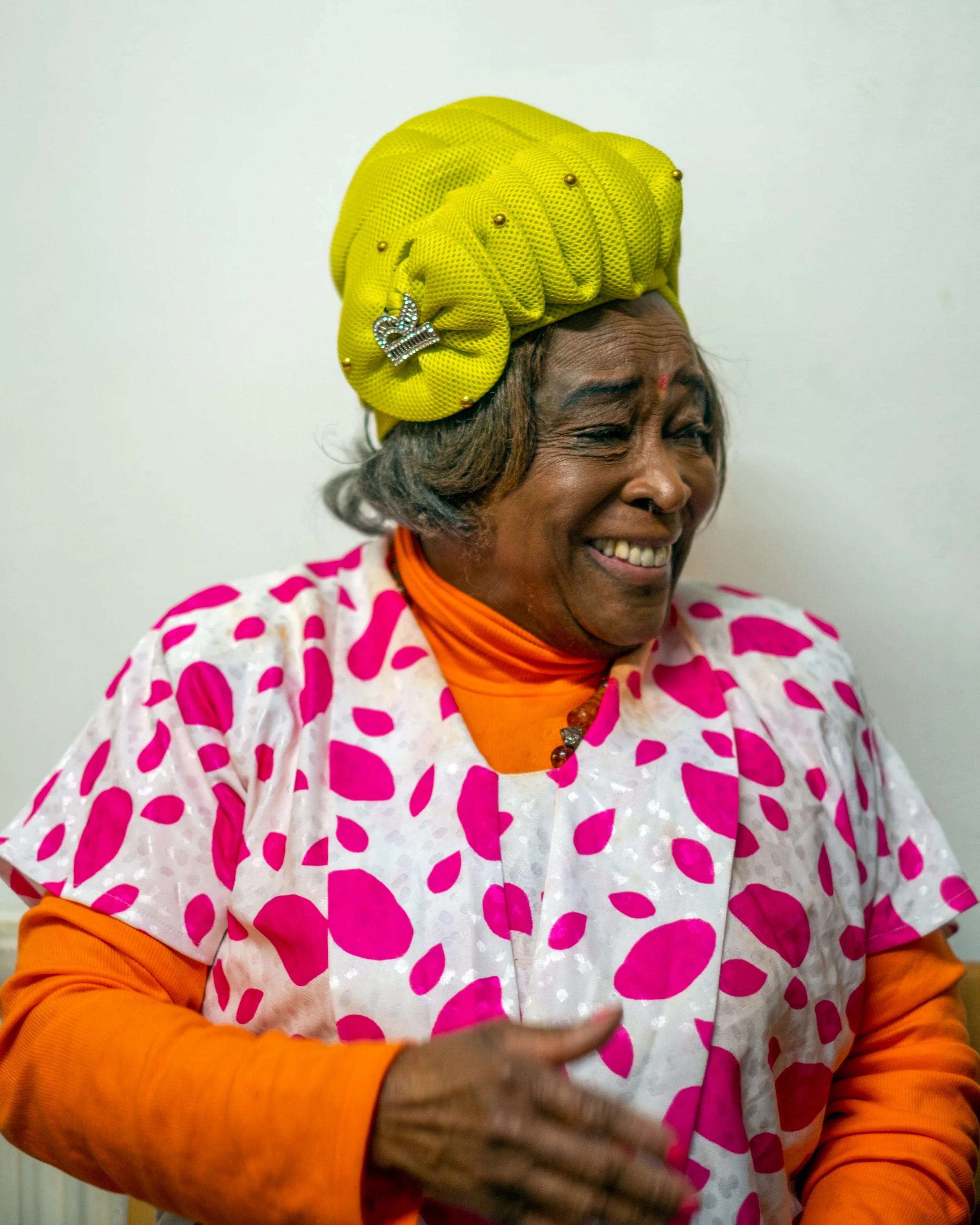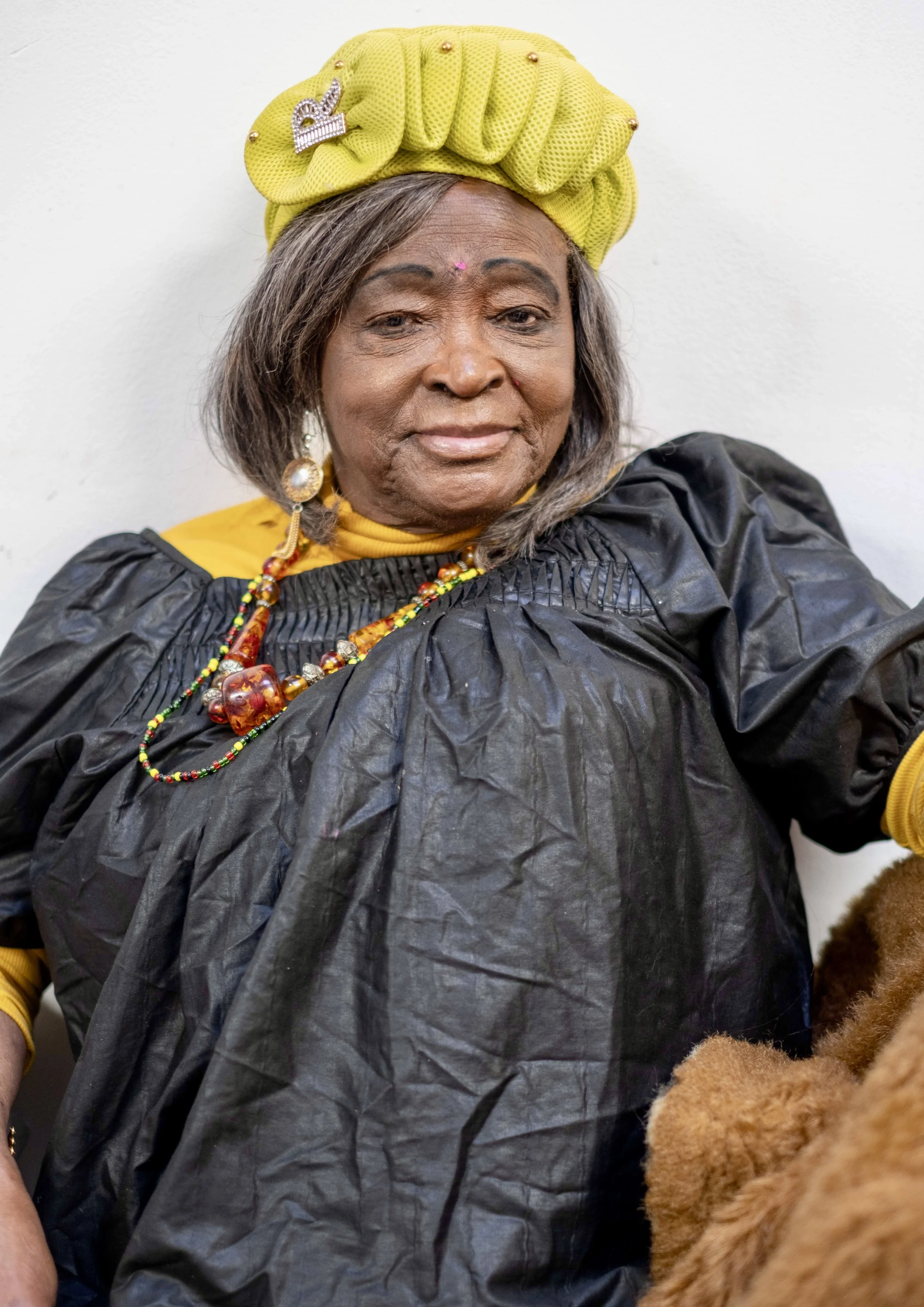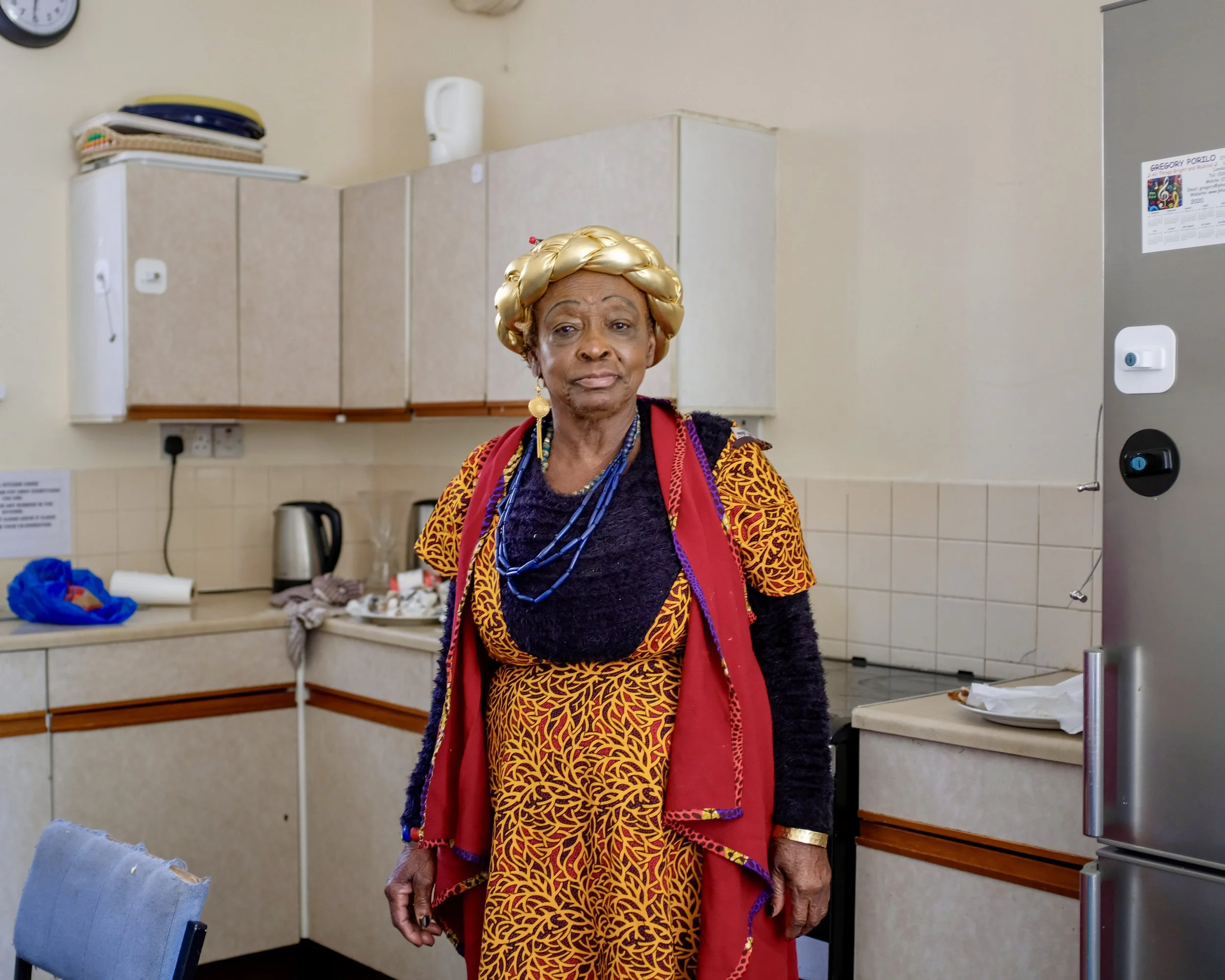Helen
I was in Balham High Road when a woman walked by carrying a bunch of artificial flowers and I asked to take her photo. Helen is 80 and is from Ghana. She came to the UK in the '60s after a military coup in her country. She has had several jobs but worked most of her life as a social worker for Wandsworth Council helping youths with learning difficulties.
When she was in her sixties, a routine health check showed that she had high blood pressure and was told that she had to take early retirement. It was then that she did a course in flower arranging. She's always loved flowers and remembered being a three-year-old back in Ghana drinking the nectar from Hibiscus flowers in the garden. Her family said that she would 'fight the butterflies for the nectar.' Helen told me that she can remember every day of her life.
Helen then volunteered for the charity Age UK teaching flower arranging herself and cooking. Helen informed me that she is an excellent cook and that Chinese food is her specialty. She has been helping the charity for 19 years now and still provides flowers for local funerals and events.
Helen is the 7th of 12 children. Her mother died aged 110, and she told me that her grandmother was 129 when she died - I said that this sounded unlikely, but Helen was adamant that she was correct. Helen told me that women from Ghana live a long time and that she has 12 relatives over 100-years-old 'all of them waiting to die, but they never get around to it.'
Sadly, Helen's daughter wasn't so lucky. She died of breast cancer at just 33. Helen told me that she has a picture of the white coffin that she was buried in and asked me if one day I'd take her to visit her grave as she's made a new flower arrangement for it.
I asked her how England has treated her. She told me that people are good and bad no matter their skin colour or where they were born. 'Everybody has the same coloured blood; we are all sisters and brothers.' She told me that she was once followed home by a man from Nigeria who managed to get in her flat and wouldn't leave until she called the police. I asked her if she was frightened - she said, 'men don't frighten me - I can fight them. No man scares me.'
The ring that Helen got when she was made ‘Queen Mother’
Helen loves flower arranging.
Helen at her husbands grave. I asked if Helen wants to be buried with him, She said ‘No way, I’m being buried with my daughter’
I took Helen to visit her daughter's grave in West Norwood Cemetery. She told me that she was a wonderful daughter and was known as 'Lady Annah'. I asked why and Helen told me it's because Annas' Grandmother on her dad's side was a 'Queen Mother’, and it was she that gave Annah the title. Helen added that she too is a Queen Mother but from a different tribe in another part of Ghana.
Each town in Ghana has a royal family that descends from the first family to settle there. A Queen Mother is the female head of the royal family. There are approximately 10,000 in Ghana. (Wikipedia)
Helen told me that being a Queen Mother means that a woman having trouble with her husband will come to Helen, and if a young person is looking for a husband or a wife, they will go to her. She says this still happens here in England.
Helen showed me a ring on her finger that she was given when she was awarded the honour and also, a photo of her in Ghana, wearing a magnificent dress and a lot of gold. She was a size 16 back then, which according to Helen," is a proper and correct size for a woman." An illness has caused Helen to lose weight, and she is "far too skinny now." She told me that she eats a McDonald's every day to try get big enough to fit into her old dresses again.
As we left the cemetery, Helen said that it didn't seem right to visit her daughter's grave but not her husband's. I said, of course, and asked her to point out where it was. Helen told me that it was actually in a different cemetery over in Tooting. About an hour later, we finally made it across South London to the graveyard where Helen's husband was buried. He was a doctor when he was alive an Helen told me that he was a quiet man but that he had "a quick temper." I asked if she will be buried here with her husband, and she said, "no way, I am being buried with my daughter."
I then dropped Helen back at her flat. She said she was pretty tired and would have a quick rest as in the evening she was busy. She'd promised to cook a Chinese meal for the Portuguese family in the flat next door. "God gave me busy hands," she said with a laugh as we said goodbye.
Helen in her flat surrounded by her flower arrangements.
I was working at home when I got a call. It was Helen asking if I would take her to pick up her medicine. When I got to her flat, she was outside and had lost her keys. Luckily the door was still open and I had to go in and help find them. I could see why they got lost. The place was full of stuff that Helen had collected over her lifetime. She showed me family photos and certificates from Wandsworth council for her social work.
Eventually, we found the keys - they were in her shopping trolley all along. Helen offered me a brandy. I said I can't drink and drive, she replied, "have vodka instead - the police can't smell it on your breath."
Helen showed me a photo of her dad, who was an accountant back in Ghana. He had pale skin because he ‘had white blood in him.’ Helen's family comes from Kira, which is on the coast, and "when the white sailors came, I'm afraid to say that they raped our great-great-grandmothers." Helen's dad was a good-looking man, and Helen said, "Women would beg him to have sex with them." Her mum was a businesswoman and travelled a lot and her dad was happy to oblige the woman when she was away. Helen thinks she has around 20 half-siblings from her dad's liaisons.
Helen was her dad's favourite though, and she would sleep in his bed, but he would “send her away” when he had a woman over, and this would make Helen jealous. Her dad died at just 49. Helen told me with a laugh, "he f**ked the life out of himself."
After I took her to the chemist, Helen insisted that I took her to Brixton market to buy me some goat curry to say thanks. She made me park on a double yellow line outside and told me not to fuss when I said I would get a parking ticket. Sure enough, a traffic warden appeared immediately. However, he turned out to be one of Helen's nephews, so instead of giving me a ticket, he was commandeered into helping Helen across the road to the market. A few minutes later, Helen appeared with a container containing the curry, and we said goodbye. It's been great getting to know Helen. She is a force of nature, and I expect her to live at least as long as her mother and wouldn't be surprised if she made it to her grandmother's age.
Helen in her hallway. To the top of the shot you can see Helen with the Mayor of Wandsworth. Back then, she was a size 16 which she informed me is ‘a proper size for a woman.’ Helen eats McDonalds when she can to try to put on weight so she can wear her favourite dresses again.
Helen is a religious woman. The calendar belonged to her husband.
Before the Coup in Ghana, Helen worked in a bank.
Helen enjoys painting and the artwork in this shot is her own.
The front door to Helens’ flat.
In Ghana, If a Queen Mother or a Chief dies, they cannot be buried until they find a replacement so their body is kept in cold storage.
The government pay for this as a mark of respect.
Yesterday, a Chief that Helen was related to was, after a year of waiting, finally buried back in Ghana.
Because of Covid, Helen could not attend, so she visited her daughters grave in South Norwood instead to give a blessing to the Chief. Her daughter didn’t drink so she poured some Super Malt on the grave for her. The whiskey was for the Chief. When he visited Helen his favourite brand was Johnnie Walker Black Label.
In Helens’ sitting room is a photo of her daughter ‘Lady Annah’ and the white coffin that she was buried in.
When Helen was small, she wanted to be a nun. She even went to a convent back in Ghana. She didn't like it though, so she 'ran away.'
She is now a 'Pressie' (Presbyterian) and still goes to church every Sunday - and often will go to three.
Firstly, she goes to the St George's Catholic Church in Kennington at 8am for Sunday Mass. Then she heads off to Stockwell to the United reform church. I said that these churches practice different religions, and she replied that, 'God doesn't care what church you go to.'
After this service, she will head off to McDonald's for a saver meal.
Then it's off to Dulwich to another church which she told me ‘Is the fun one.' They have a band and dancing a big choir. She said about 400 people turn up sometimes.
It was at this last church that Helen fainted, and she was taken to hospital by ambulance.
In the short time that I've known her, she's had a few health issues. Her feet kept swelling up, and the doctor said it's because she has very low blood pressure. Sure enough, when she was taken to the hospital, they confirmed that her heart was sluggish and that she needed a heart operation and a pacemaker.
Initially, Helen refused this. She read that pacemakers only last for 15 years, and she told the doctors that even though she's 81, she intends to live for at least another 30. (Her mother made it to 110, and Helen thinks that she will live longer still).
Eventually, Helen was persuaded by the doctors and some relatives, who are also in the medical profession, to have the operation.
At the time of writing, Helen has been in hospital for a couple of weeks now, waiting for the operation. She told me that the doctors and nurses have been brilliant and have all made a fuss of her. It was clear when I visited that she was the centre of attention in the ward.
She told me that she persuaded some of the staff to go down to the shop to get her some lottery scratch-cards, and before I even had time to say hello, she sent me down to collect her winnings.
Last week she was put under anaesthetic and taken down to the operating theatre. Just before they were about to operate, there was an emergency, and somebody else was put into the theatre.
Helen wasn't in the slightest bit bothered by missing her slot. She said that she was grateful that someone who needed treating more than her took her place. She added that, 'it wasn't my time.'
A relative gave Helen £1000, and she sent someone down to the hospital shop and spent £300 on clothes. As a Queen Mother, she said that she has to always look her best, even when in hospital. She gave the remaining £700 to the hospital charity.
Helen told me to take this shot. She wanted people to see how 'lovely it is in the hospital' and told me to write about how well the nurses are treating her. (she is convinced that I am a journalist, even though I keep telling her otherwise).
Helen had her operation a few days ago and is currently in ICU. Once she's feeling better, I'm sure that I will get a call from her asking me to bring her some more scratch cards.
I took the photo above when Helen was in hospital waiting for a pacemaker to be fitted. About a week later, I was passing the hospital, so I thought I'd go in and see how Helen was.
She wasn't in the previous ward, and after a lot of walking around, I found her in the Critical Care Unit. At first, I barely recognised Helen. She was surrounded by equipment and wasn't wearing her wig. She was unconscious with a ventilator tube coming out of her mouth. A nurse took me to one side and explained that Helen was extremely unwell but that she couldn't give me more info because I was not a relative. I asked if I could leave a note for Helen. The nurse took it and said, "If she does wake up, I will give it to her, but you should know that she is very poorly indeed."
Over the next couple of weeks I called the hospital but they couldn't tell me anything because I was not a relative. I also rang both of Helens' mobiles which went straight to voicemail. After a month of hearing nothing, I presumed that Helen had passed away.
3 weeks later, I got a call from Grace, who runs the centre where I first met Helen. She told me that Helen had been in a coma for 55 days and had just regained consciousness. Grace was as surprised as me that Helen was still with us.
When I phoned the ward, the nurse that answered knew Helen and said that I could come in for a visit. Helen looked very small and frail when I got there, sitting next to the bed with her cropped grey hair. She was clearly on strong medication and was not her usual chatty self. She was pleased to see me, but I also suspected she was embarrassed for me to see her not dressed in her usual finery.
The first time I saw her in hospital back in August, she was immaculate and was the centre of attention. Now she was just another frail older woman on the ward. Also, being in a coma for so long meant Helen would have to relearn how to walk, which must be hard to process for someone normally so active. It was a brief visit as Helen was clearly exhausted.
A week later, I phoned to see if I could visit again. A different nurse answered and said that I couldn't come in as I was not a relative. I left my details and asked her to tell Helen that I'd called. Five minutes later, the hospital rang me back, and they put Helen on. She said, "Come and see me now. I have my hat."
She looked a lot better than before and was indeed wearing her hat. I had to sit quietly at first while she did the scratch cards that I bought her. She didn't win, unfortunately.
A lot of her spark had returned, but she wasn't the confident and outspoken force of nature that I had first met a year ago. The operations, the coma, and the 110 days spent in the hospital had taken it out of her. Helen now has a walker and, with the help of a nurse, can get herself from bed to the WC.
She told me that they are looking after her well at the hospital. The physio is helping her to get mobile, and the nurses wash her every day. I asked her how it felt for such a proud woman to be washed by a stranger. She shrugged and said, 'It is what it is. I am grateful that they are taking good care of me.'
I told Helen about when I saw her on the ventilator, and she asked to see the photos. I said that I didn't take any because it felt disrespectful. Helen was disappointed. She said she would like to have seen herself during those missing two months of her life.
Helens ward is on the 10th floor and directly faces the River Thames. I asked if she liked the fantastic view of Big Ben and The Houses of Parliament. Helen said she never looks, "There's no way I'm ever going to look out of that window - it's too high up and way too scary." We both laughed about this, but then Helen suddenly became very serious. She looked straight at me and asked, "Do you think I will ever go back to how I was?" To be honest, I didn't really know what to say. Eventually I said, '3 weeks ago you were half the person you are now, so who knows what you will be like in 3 weeks time?' I hope it reassured her a bit but the trouble is, Helen is no fool.
Because the hospital lost her teeth. Helen insisted that she wore the mask for the photo.
The hospital lost Helens' false teeth, so until they are replaced, she will only let me take a photo if she wears a mask.
She had to relearn how to walk when she came out of the coma.
As part of her rehabilitation, she decided to walk to the corner of her street and back 20 times daily. Eventually, she conceded that walking down the concrete stairs from her first-floor flat was risky, so she now walks the length of her hallway 100 times.
While in hospital, someone tidied Helen's flat. They threw out a lot of the stuff she had hoarded over the years, and the place looks much better. Unfortunately, they also 'tidied away' her jewellery and the many bottles of spirits she kept in her sitting room.
Helen seems less bothered than me by this. She says she has plenty more jewellery back in Ghana and is just grateful to be getting better.
The coma caused Helen to forget how to do many everyday things. Having your brain switched off for months means information gets lost.
She did the scratch cards I bought but didn't know if she'd won. She told me to take them to Sainsbury's to check. (I don't understand scratch cards).
She said not to take them to a corner shop as they often tell old people they've lost and keep the winnings for themselves. Helen said you can trust the staff at Sainsbury's.
Helen has also forgotten her bank details.
When we have a problem with the bank, we get on the phone or go online and eventually sort it out. We joke about how we never deal with an actual human nowadays. But to older people, it's no laughing matter.
Online services, pin numbers, self-service checkouts, automated call centres, etc., supposedly make life more convenient for us and create more profits for big organisations. But this impersonal way of doing things makes life difficult for older people.
Despite both being victims of theft, Michael (see previous posts) and Helen have shared their bank details with me, hoping I can help them. I hardly know them, but they are so anxious and confused by the system that they have little choice.
One imagines old age to be a stress-free time in life. Thanks to our increasingly automated world, the opposite is often true.
Helen outside the medical centre.
Having been in a coma for over 2 months, has meant that Helen has forgotten a lot of information including how to do the scratch cards that I got her. Before she was unwell, she could do a scratch card in a matter of seconds. She told me to take the scratch cards to be checked at Sainsbury's because she trusts the staff there.
I've seen Helen a few times since she came out of the hospital, but she wouldn't let me photograph her because the hospital lost her false teeth.
They've just given her new ones, but she says they are loose. To emphasise the fact, she opened her mouth and showed me how they slip down.
She was weak and confused when she first came out of the hospital. Being in a coma for several months took it out of her.
Gradually, her old self has returned. She is back to being the centre of attention in the room and is getting out and about much more.
She even let me take this shot.
The problem with Helen is that she won't take things slowly.
Shortly after I took this shot, she went shopping and, as usual, despite living alone, bought enough fruit, vegetables and chicken from the market to feed a large family. When she was carrying this home, she had a heart attack.
This happened last week, and she phoned me from the hospital to tell me that an ambulance had taken her to the emergency ward and that the hospital was treating her well. Typically, rather than being miserable about having a heart attack, Helen is grateful that she has survived it and is still determined to get to 130.
She phoned me again two days ago and said she was feeling much better. The hospital wants to keep her under observation for a few more days because, in her words, "My new medication means I am shitting and pissing blood." She then asked if I could "Bring me my Madonna." Helen speaks loudly on the phone and has a strong accent. She repeated this phrase several times before I realised she wasn't asking for something religious. She was actually asking for her McDonald's.
I got her usual Fillet-O-Fish and a Diet Coke and took it to her at the hospital. When I got there, the nurse said it was okay for her to have it as there was no sugar in the Diet Coke. (I doubt she would have been able to say no to Helen anyway).
Helen was delighted that I bought her the food and said she was feeling much better. In front of everyone else in the ward, she announced that she was still "Shitting and pissing blood" but that it was not as bad as it was before and that she would be coming home soon.
Helen is getting back to her usual self.
Helen was discharged from the hospital and is photographed here after attending a friends funeral. She even had a dance at the reception afterwards.
Helen loves to cook Chinese food. She often helps out in the kitchen of a local charity.
